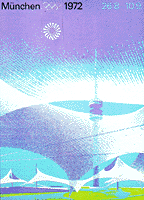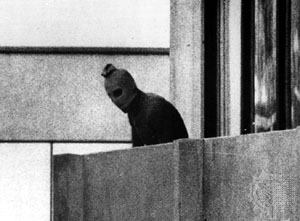HISTORY OF THE MODERN OLYMPICS
Munich, West Germany, 1972
 |
| Olympic posters from the Archives, Olympic Museum Lausanne, from the book The Olympic Spirit, published by Tehabi Books |
More than 7,000 athletes from 122 nations participated. The track-and-field competition was marred by protests over equipment, scheduling problems, and incidents on the track. Soviet sprinter Valery Borzov won both the 100- and 200-metre runs when two of his chief competitors, using a schedule with out-of-date starting times, missed their heats. Lasse Virén of Finland captured the gold medal in the 5,000- and 10,000-metre runs. Frank Shorter became the first American since 1908 to win the marathon.
 |
| A Palestinian terrorist appears on a balcony in the Munich Olympic Village, where members of the Israeli team were being held hostage |
| AP/Wide World |
Archery returned to the Games for the first time since 1920, with events for both men and women. Soviet athletes Olga Korbut and Vasily Alekseyev made their Olympic debuts in 1972. Téofilo Stevenson of Cuba won the first of his three boxing gold medals in the heavyweight division.
The Soviet Union captured the gold medal in basketball, snapping the United States' unbeaten streak in the Olympic competition. The gold medal game between the two teams ended in one of the most disputed results in Olympic history. The controversy began when Doug Collins of the United States sank two free throws to give the U.S. team a 50-49 lead with three seconds remaining. The Soviets inbounded the ball, but head referee Renato Righetto of Brazil stopped the game with one second on the clock. After a conference among the officials, it was determined that the Soviet coach, Vladimir Kondrashkin, had called time-out. The clock was reset to three seconds, and the Soviets were allowed to inbound the ball once more. The Soviets attempted a desperation shot from midcourt that was off the mark, and the U.S. team began to celebrate. However, Kondrashkin protested that the clock had not been reset correctly, and R. William Jones, an International Amateur Basketball Federation official who had no actual authority in the contest, agreed with the Soviet coach. The game officials were persuaded to give the Soviet team another three seconds. This time the ball came to Soviet star Aleksandr Belov, who sank the winning basket. The U.S. team, believing that the final result was unfair, did not attend the victory ceremony, refused their silver medals, and filed an official protest. Despite sworn testimony from the referee and the timekeeper that the Soviet victory was illegal, a five-man jury of appeal denied the U.S. protest.
Introduction * Early History * Revival of the Olympics * Organization of the Modern Games